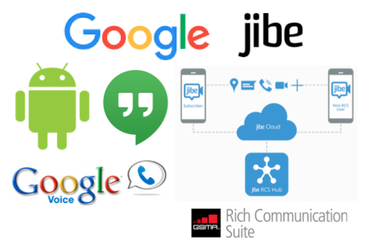 I believe there were several motives that propelled Google to pull the trigger this past week on acquiring RCS player Jibe. This is part of their multi-pronged attack on the consumer need for communications and interactivity. Having worked at Verizon Wireless to help define their Rich Communications strategy and service realization back in 2010, there are a range of drivers that come to mind that I note below. As with many mobile carrier efforts, the GSMA's Rich Communications Suite (RCS) has been plagued by slow adoption and weak execution. Even after watering down the original (more feature rich) version of RCS, carriers struggle with embracing and driving consumer adoption for the suite of new enhanced messaging services enabled by RCS. Google has had its hand in driving adoption of WebRTC however on the desktop browser front. Some of this carrier challenge with RCS is due to their DNA being primarily a mover of bits and wireless infrastructure engineering expertise, but also due to their loss of control of the handset. Today, there is very, very little Verizon, AT&T, Sprint or T-Mobile content or customization on your latest smartphone here in the US. There is even less carrier content that actually gets used or adds value to the consumer. Voice over LTE (VoLTE) is going to happen and that is the last opportunity for carriers to layer in some value-add around their investment in IMS technology with integral voice, video chat, rich messaging, voicemail transcription, multi-ring mobile / landline, and presence indicators. Enterprise Unified Communications is a different beast. Carriers may not gain from Google's push into RCS here, depending upon Google's ultimate motivations. Similar to what I am seeing with my efforts in the mHealth / Healthcare IT space with a vast amount of wearables devices, mobile / IoT platforms and the array of clinical systems / EHRs, this is not a technology problem. It is about integration / compatibility, organizational execution and the right inspired innovation around an overwhelming amount of available technology and platforms. Here is my view of Google’s drivers behind scooping up Jibe:
1 Comment
|
 RSS Feed
RSS Feed
